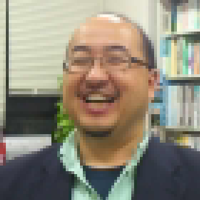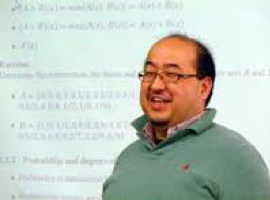Keynotes
-
Fuzz Logic for Artificial Intelligence ~Contributions and Advantages~ (Prof. Atsushi Inoue)
Machine learning for socially assistive intelligent robots operating in human environments (Prof. Genci Capi)
-
AIoT Systems and their Applications (Prof. Yo-Ping Huang)
Fuzzy Logic for Artificial Intelligence
~Contributions and Advantages~
Atsushi Inoue, Ph.D.,
Professor of Information Systems and Business Analytics,
Eastern Washington University, USA
Web: http://www.inoueatsushi.net/
CTO & Global R&D Leader,
BaaSid Project, the Pas Pacific Venture in JP, KR, HK, TW, SG, AU & US
Web: https://www.baasid.com/
Abstract
This talk addresses what and how Fuzzy Logic has contributed to the advancement of Artificial Intelligence, and why it is advantageous to be considered and indeed utilized. Such advantages are introduced within the fundamental framework of Artificial Intelligence consisting of logic and probability, and by showing how Fuzzy Sets and Logic may extend those and more (e.g. Neural Networks and Evolutionary Computing). Applications relevant to Image Processing and Robotics are introduced within this extended framework. Last but not the least, such a framework does indeed demonstrate the consistency between computing in numbers and human reasoning in languages -- so-called Computing with Words by Professor Lotfi A Zadeh.


Bio.
Atsushi Inoue is an Artificial Intelligence specialist (especially in Fuzzy Logic) in USA and Japan. He has been affiliated with top-notch industries and institutes in several countries, including Hitachi Ltd. (Japan) and Carnegie Mellon University (USA). He is currently home at Eastern Washington University to enjoy his life in the beautiful evergreen, while advising various digital entrepreneurships and intelligent system projects. Recently, he is participating in the global blockchain startup for advancing our lives in the severe information centered society. He earned his Ph.D. in Computer Science and Engineering at the University of Cincinnati (USA) in 1999.
Machine Learning for Socially Assistive Intelligent Robots Operating in Human Environments
Prof. Genci Capi,
Department of Mechanical Engineering,
Hosei University, Japan
Abstract
The research on intelligent robots will produce robots that are able to operate in everyday life environments, to adapt their policy as environment changes, and to cooperate with other team members and humans. Operating in human environments the robots have to be process in real time a large number of sensory data such as vision, laser, microphone, in order to determine the best action. Learning and evolution have been proved to give good results generating a good mapping of various sensory data to robot action.
In this talk, I will overview the existing efforts including our attempts at creating intelligent robots operating in everyday life environments. In particular, I will focus on remotely operating surveillance robot, robot navigation in urban environments, and assistive humanoid robot. I will show experimental results that demonstrate the effectiveness of proposed algorithms.

Bio.
Genci Capi received the Ph.D. degree from Yamagata University, in 2002. He was a Researcher at the Department of Computational Neurobiology, ATR Institute from 2002 to 2004. In 2004, he joined the Department of System Management, Fukuoka Institute of Technology, as an Assistant Professor, and in 2006, he was promoted to Associate Professor. He was a Professor in the Department of Electrical and Electronic Systems Engineering, University of Toyama up to March 2016. Now he is a Professor in the Department of Mechanical Engineering, Hosei University. His research interests include intelligent robots, BMI, multi robot systems, humanoid robots, learning and evolution.
AIoT Systems and their Applications
Prof. Yo-Ping Huang,
Department of Electrical Engineering
National Taipei University of Technology, Taipei, Taiwan
Abstract
Through several waves of downhills and uphills in the past decades, Artificial Intelligence (AI) has now evolved into a must have new technology or tool in every domain. Furthermore, with the advent of powerful GPU, AI-related research or AI-based applications have sprouted in every corner of the world. Originated from pure internet connectivity the Internet of Things (IoT) has become a structure that can collect every piece of data from physical devices, daily activities, images or video into a data reservoir. As a result, tons of data are automatically generated into an enterprise database in a single day. This creates continuing demands on applying AI, IoT, and big data analytics to extract juicy contents from the huge databases. This talk will address from the AI and IoT, big data mining and system engineering perspective for systems developed to resolve the sensing, networking and applications faced in healthcare, defect image detection in manufacturing, and agriculture. Case study of AIOT in exercise monitoring and control using Kinect and Tensorflow, rehabilitation monitoring and tracking on joint rehabilitation monitoring after Total Knee Arthroplasty Reconstruction (TKA), Parkinson’s Disease (PD) using sensor devices, ophthalmological images classification, AOI defect image detection and labelling, fruit, vegetable and fish growth monitoring will be demonstrated in the talk.

Bio.
Yo-Ping Huang received the Ph.D. degree in electrical engineering from Texas Tech University, Lubbock, TX, USA. He is currently a Professor in the Department of Electrical Engineering and Director of AIOT R&D Center, National Taipei University of Technology, Taipei, Taiwan, where he served as the Secretary General. He was a Professor and the Dean of Research and Development, the Dean of the College of Electrical Engineering and Computer Science, and the Department Chair with Tatung University, Taipei. His current research interests include fuzzy systems design and modeling, deep learning modeling, intelligent control, medical data mining, and rehabilitation systems design.
Prof. Huang serves as the President of the Taiwan Association of Systems Science and Engineering, IEEE SMCS BoG, Chair of the IEEE SMCS Technical Committee on Intelligent Transportation Systems, Associate Editor of IEEE Trans. on SMC: Systems, Associate Editor of Int. Journal of Fuzzy Systems, and the Chair of the Taiwan SIGSPATIAL ACM Chapter. He was the Chair of IEEE SMCS Taipei Chapter, the Chair of the IEEE CIS Taipei Chapter, and the CEO of the Joint Commission of Technological and Vocational College Admission Committee, Taiwan. He is an IET Fellow and an International Association of Grey System and Uncertain Analysis Fellow.